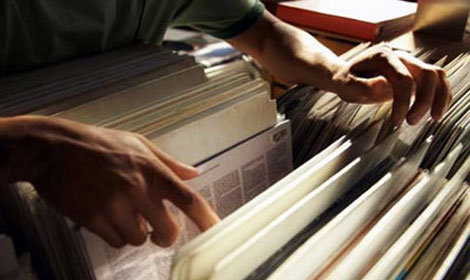Okay, let’s play devil’s advocate for a minute and view the use of samplers as nothing more than technological Robin-Hoodism; with producers stealing pieces of music and then playing it back for their own audience. Copyright norms generally protect the composition of a piece of music as well as the recording of it. Some would say that the samplers’ ability to capture both of these components is tantamount to stealing; however in order for this to be true it would rely on the following assumptions;
- The producer is attempting to pass off the piece of music as his/her own original composition.
- The listener experiences the music in the same way as the original recording.
- Borrowing of music is always unethical and creative works are born independently.
Now let’s scratch (*groan* pun intended) the surface of the above arguments to assess their validity.
1. The producer or the plagiarist?
Whilst the use of samplers is common amongst most music genres, it has to be acknowledged that the Hip Hop tradition has a particularly rich history of (re)creating innovative work from existing recordings, with producers employing techniques such as cutting, scratching, digital sampling, looping and mashing to create new sounds and beats. Indeed, the act of borrowing music and “flipping” it with the producers’ unique interpretation has become the hallmark of musical innovation born out of Hip Hop. I would argue that this in turn, has created a norm amongst audiences; we do not expect a producer to have necessarily made the beats organically, we know we are listening to a remixed interpretation. As far back as the first DJ battles with Afrika Bambaataa v. Disco King Mario in the mid 70’s, the producers in the Hip Hop scene were competing for audience response- a response that relied on working up a crowd through not their ignorance of music, but their actual familiarity of popular R&B tracks, presented back in whole new formats. Therein lies the innovation of the producer; RZA describes his use of the sampler as “painter’s palette”- the output is not a second rate reprint of the original but a new tapestry of musical beats arranged in such a way as to elicit a whole new experience from the listener.
2. Where have I heard this before?
That leads me to the second point. As a listener let me tell you that sampled music is definitely not experienced in the same way as the original. Trying to explain personal experience in an objective manner would be a futile exercise. Have a listen for yourself; let’s take a well know and heavily sampled track; “Tears” by Giorgio Moroder, and listen to how various producers have re(created) it;
Organ Donor by DJ Shadow
Fuel Injected by Swollen Members
Tragedy by RZA
Don’t trust your own experiences? After all, just because one or two people (i.e. you and I) experience samples of the same music differently, is that really reliable evidence?
Ok, well let’s go back in time to a Bronx party happening in August 1973 and take a look at this defining moment in Hip Hop history, to better understand how sampled music can affect crowds of people in a way which the original never did. (By the way, I am in no way suggesting sampled music is superior to the original, just that they affect the listener in different ways).
Jamaican DJ, Kool Herc was failing to move the crowd, until he isolated a beat-heavy percussion of a familiar R&B song, extended it, and rhymed (rapped) over the foreground simultaneously. The crowd responded instantly with a renewed energy.
The party was definitely not dead. DJ Grandmaster Flash, a friend of Kool Herc, has gone on to pioneer this style of presenting rap music over samples of R&B records, and the rest, as you all know is history.
3. Standing on the shoulders of giants
Once we stop viewing sampled music less as a reproduction of another piece of work, and more as a collage of something novel and distinct with the power to affect audiences in a new way, it is no longer imitation but originality. Sampled music is a reinterpretation, a “flip” of various sounds and beats, inviting the audience to listen in new ways.
Whilst the earlier Hip Hop producers relied heavily on R&B and jazz tracks, Hip Hop is an evolving art that has globalised rapidly with producers now using diverse sounds from their own cultures. But isn’t this very act of borrowing and musical collaboration which serves to connect cultures and generations to produce collective experiences? Isn’t this something which has always happened, not just in Hip Hop, or even in music, but across all arts? Yes, this is an Aristotelian view to take but it’s one that holds true – why else do copyright licenses only hold for a limited time period?
It is in recognition that ideas in art and science are no more static than the societies in which they evolve. Intellectual progress is dependent on building on the work of others. Nothing in our cultural heritage is truly new; we take a baton from our ancestors which we should be ready to hand over to the next wave of creators.
So here’s my message to producers; continue to use your sampler with confidence, but please make sure you put your own unique personality into it – I know what the original song is about, now flip it, make me react and show me what you’re about.
